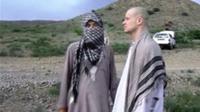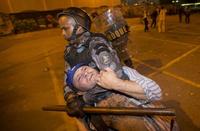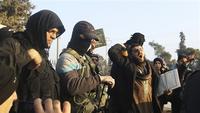-
Pentagon is capable of tracking the Taliban 5 freed from Guantanamo: experts

Critics of the White House’s release of five Taliban prisoners (Taliban 5) from Guantanamo Bay to Qatar are concerned that the group will eventually return to the battlefield in Afghanistan, posing a threat to American forces. Secretary of State John Kerry has said that doing so will open the terrorists to possible drone strikes; but that requires knowledge of their whereabouts. How might intelligence analysts track the Taliban 5 during and after their stay in Qatar? Experts say that the Pentagon is capable of tracking the former detainees using algorithms that predict terrorists’ movements based on their personal history and network.
-
-
Terror court case in U.K. continues to be held in secret, alarming critics
A major terrorism trial in the United Kingdom has also become a media cause célèbre as media representatives challenge senior judges, leading to a case which is both mysterious and well known. That came after the Crown Prosecution Service (CSP) had persuaded the case judge that the entire trial should take place in secret. No further reasons for the case have been made public, and it still remains uncertain whether the full trial will be reportable.
-
-
How has Iraq lost a third of its territory to ISIS in three days?

The Islamic State of Iraq and the Levant (ISIL), also known as ISIS, has about 12,000 fighters in its ranks. About 8,000 needed only forty-eight hours to take Mosul, Iraq’s second largest city, although it was defended by more than 27,000 government troops. It took ISIL another twenty-four hours to gain control of about one-third of Iraq – facing little, if any, resistance from Iraq’s one-million-strong security apparatus. The reasons: After the U.S. occupation force, in 2003, dismantled Iraq’s professional military, a new Iraqi army was re-established from militia members and low-ranking members of the Ba’ath army. Senior officers in Saddam Hussein’s forces were dismissed, which gave rise to at least two security issues. Firstly, military officers of the previous army were steered toward terrorist groups. Secondly, Iraq’s new military suffered from the loss of expertise and military discipline instilled by their former officers. In addition, poor governance has led to widespread corruption in both political and military spheres. Military personnel are routinely reported to be soliciting bribes, especially in Sunni areas of Iraq.
-
-
U.S. begins evacuation of Baghdad embassy; Iranian general coordinating the defense of Baghdad
The State Department yesterday (Sunday) that non-essential employees at the U.S. embassy in Baghdad were being evacuated, but that the United States would remain “fully equipped to carry out its national security mission.” The Pentagon has ordered an aircraft carrier and two missile-carrying ships to the Persian Gulf, hinting at the possibility of imminent U.S. air strikes against the advancing Sunni insurgents. The Sunni insurgents who now control about a third of Iraq said Sunday that they had executed 1,700 Iraqi soldiers, stressing that all those who killed were Shi’as. Iran had sent 2,000 advance troops to Baghdad, and General Qassem Suleimani, the commander of the Qods Force of Iran’s Revolutionary Guard, is coordinating the defense of Baghdad.
-
-
World Cup security teams focus more on crime, protests – less on terrorism

During the 2014 FIFA World Cup, currently being held across twelve different venues across Brazil, security teams have extensively prepared for measures to be taken against crime and protest related to heated political unrest. American bomb-busting robots, Israeli surveillance drones, and German anti-aircraft tanks — an international assortment of security officials and measures – are just some of the pieces of the greater security apparatus protecting both players and fans.
-
-
Administration’s $5 billion counterterrorism (CT) fund met with questions, uncertainty
The White House’s proposed $5 billion counterterrorism (CT) fund designed to help U.S. officials train and equip allied countries to eliminate elements of al-Qaeda or organized terrorism. Some lawmakers and officials familiar with the issue are unsure whether the funds would be directed toward Syrian rebels, or distributed among African countries. Others are worried that the program may interfere with other initiatives meant to accomplish similar objectives.
-
-
Digital birth card to help Kenya fight terrorist infiltration
The influx of immigrants from neighboring African states includes Islamic militants, some belonging to terrorist group al-Shabaab. Maintaining proper records of every Kenyan and immigrant will offer authorities leads on who is in the country and potentially a threat to national security. Some suggests the adoption of a Digital Birth Card (DBC) as a way to curb Kenya’s terrorism fears.
-
-
Bioterrorism as a voter fraud mechanism
In the early 1980s, a guru named Bhagwan Shree Rajneesh and his hundreds of followers, called Rajneeshees, relocated from India to a 64,000-acre ranch in Wasco County, Oregon, a rural area of roughly 21,000 people at the time. Rajneesh’s plan to build more houses on the ranch to accommodate his followers was denied by county officials. Rajneesh had an idea: to win seats on the County Commission, the Rajneeshees decided to suppress non-Rajneeshees voters by poisoning thousands of residents with Salmonella prior to election day, and then recruit thousands of homeless people from nearby cities and offering them food if they voted for Rajneeshees-backed candidates.
-
-
Defense in terror case challenges exclusion from court session on surveillance records
The defense for Adel Daoud, a young Muslim man who was arrested outside a Chicago bar in an undercover FBI operation and charged with attempting to blow up the bar, has submitted a motion objecting to a private court session held to discuss the defense’s access to classified records. “Not only do I not get to be there, but I didn’t even get to object,” defense attorney Thomas Durkin said. “I had to object over the fact that I couldn’t even make an objection.”
-
-
Advancing microbial forensics to respond to global biological outbreaks
Much as human DNA can be used as evidence in criminal trials, genetic information about microorganisms can be analyzed to identify pathogens or other biological agents in the event of a suspicious disease outbreak. Biological outbreaks can include natural occurrences, accidental, or negligent releases from laboratories, biocrimes aimed at individuals or small groups, or acts of bioterrorism and biowarfare intended to affect large populations. The tools and methods used to investigate such outbreaks belong to an emerging discipline known as microbial forensics, but the field faces substantial scientific and technical challenges, says a new report.
-
-
States have consistently negotiated with terrorists to get back their citizens
The prisoner exchange with the Taliban has been met with criticism from some quarters, but, in fact, there is nothing unique about it, as the record shows that states around the world do negotiate with terrorists in order to get back their citizens or advance other goals. For example, since the early 1980s, Israel has freed nearly 8,000 Palestinian terrorists, and Palestinian and Arab prisoners, for fewer than twenty Israelis — soldiers and citizens who were held captive by Hezbolla and Hamas, and the bodies of several dead Israelis soldiers Hezbollah held as bargaining chips. Experts say that arguments can be made for or against theBergdahl exchange on its merits, but what cannot be argued is that the exchange should not have been made because it involved negotiations with terrorists.
-
-
Expatriate Jihadists operating in Syria explain views, alarm West

More than 3,000 Westerners — among them 70 Americans — are believed by intelligence and counterterrorism officials to have traveled to Syria to join the war against the government of president Bashar al-Assad. Many of them engaged in what they believe is a holy war. This increase in the number of expatriate jihadists has led to a more aggressive response by security officials. In Britain, the Home Office stripped more than twenty individuals of their citizenship, and in just the first three months of this year there was a spike of more than forty “Syria-related arrests.”
-
-
Growing Jihadist threat demands new U.S. strategy to combat terrorism: RAND study
There is a growing terrorist threat to the United States from a rising number of Salafi-jihadist groups overseas, according to a new RAND study. Since 2010, there has been a 58 percent increase in the number of jihadist groups, a doubling of jihadist fighters, and a tripling of attacks by al Qaeda affiliates. The most significant threat to the United States, the report concludes, comes from terrorist groups operating in Yemen, Syria, Afghanistan, and Pakistan. There is a medium-level threat from terrorist groups operating in Somalia, Iraq, Libya, Lebanon, Nigeria, and Algeria. There is also a low-level threat from Salafi-jihadist groups operating in such countries as Tunisia, Mali, and Morocco.
-
-
Floridian is first known American suicide bomber in Syria

Floridian resident Moner Mohammad Abusalha is the first known American suicide bomber in Syria’s civil war. His death last May came as a surprise to U.S. counterterrorism agencies, which had lost track of him once he entered Syria. Some 12,000 foreign fighters have so far taken part in the Syria civil war — 3,000 of them from Western countries — and the inability to track these foreign fighters reflects a troubling blind spot for Western intelligence agencies. U.S. intelligence services are further hampered by legal restrictions which limit the monitoring of U.S. citizens and their communications.
-
-
With massive presence of foreign fighters, Syrian conflict resembles 1980s Afghanistan war
A new report by the Soufan Groupestimates that in just three years, 12,000 foreign fighters have traveled to Syria to support various rebel groups fighting the government of President Bashar al-Assad. U.S. and Israeli intelligence previously estimated that there were 7,000 foreign fighters in Syria at the start of 2014. Security experts are comparing the situation to the influx of foreign fighters into 1980s Soviet-occupied Afghanistan, which saw 10,000 foreign fighters battle the Soviets in the decade-long conflict that spawned al-Qaeda.
-
More headlines
The long view
What Does Netflix’s Drama “Adolescence” Tell Us About Incels and the Manosphere?
While Netflix’s psychological crime drama ‘Adolescence’ is a work of fiction, its themes offer insight into the very real and troubling rise of the incel and manosphere culture online.
